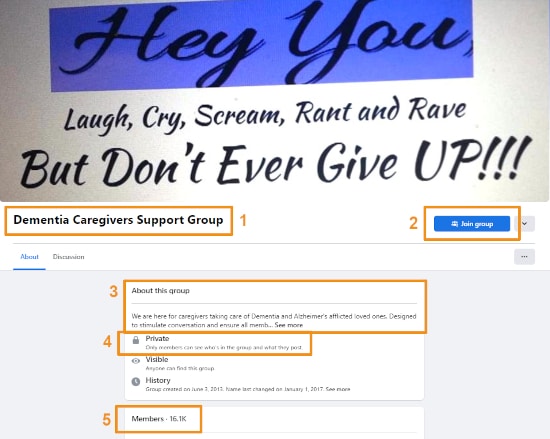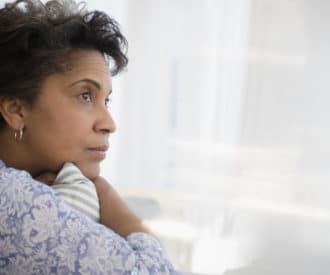Caregiving can feel lonely and overwhelming, but you don’t have to go through it alone. Facebook caregiver support groups offer a safe space to connect with others who truly understand the challenges you face, whether you need practical advice, emotional support, or just a place to share your thoughts.
With thousands of members worldwide, these online communities provide compassion, resources, and reassurance at any time of day. In this article, we’ve rounded up 14 of the best Facebook caregiver support groups to help you find the encouragement and camaraderie you deserve.

Support Groups for Caregivers are at Your Fingertips on Facebook
Caring for an older adult can be a difficult and isolating experience.
An effective way to reduce stress and not feel so alone is to join a caregiver support group.
On Facebook, there are many private groups dedicated to families who are caring for older adults.
They’re completely free and allow you to get support, vent, or ask questions anytime, day or night. If you use a smartphone, you can participate from anywhere.
We share 14 top Facebook support groups for caregivers, describe each group’s focus (such as Alzheimer's disease and dementia, aging parents, and general caregiving), and explain how to join.
14 Recommended Support Groups for Caregivers on Facebook
Each of these 14 group names is linked to its private group page on Facebook.
We’ve also included information from each group’s description so you’ll know which topics each one focuses on.
1. Memory People
Memory People™ is an Alzheimer's/dementia and memory impairment support and awareness group created in November 2010 by Rick Phelps, a patient himself, diagnosed with Early Onset Alzheimer's disease at the age of 57.
We don't talk about miracle cures or false remedies here. We share about the reality of dementia and memory impairment, and through support and education, we find the ability to take another step each day in this journey.
Memory People is a safe, comfortable place to find real-time support for those touched by dementia related diseases and any type of memory impairment, including TBI, etc.
2. Dementia Caregivers Support Group
We are here for caregivers taking care of Dementia and Alzheimer ‘s-afflicted loved ones.
Designed to stimulate conversation and ensure all members have a haven in posting personal feelings.

3. Alzheimers and Dementia Caregivers Support
You will see posts here that may upset you: it's honest, raw, brutal, and the truth.
This page has a singular purpose: to be a supportive haven where caregivers of people with dementia can share their struggles without fear of judgment or reprisal.
4. The Purple Sherpa Basecamp (Dementia Family Caregiver Support Group)
Are you a care-partner for a loved one who has Alzheimer's Disease and/or another form of dementia? You're in the right place.
I was my father's primary caregiver for more than seven years (he died in July 2017 from end-stage Alzheimer's, with a secondary diagnosis of vascular dementia), and it was the most exhausting, frightening, & loving experience I've ever had.
I started this group as a place to share what we've learned as care partners, to vent and support one another, and to break the silence that leaves many caregivers feeling alone.
5. Caring for Elderly Parents
Our turn to parent: helping our elderly loved ones negotiate the world is the most challenging job we've ever undertaken.
As we learn to cope, we share information, vent our frustrations, and offer support.
6. The Caregiver Space Community
Are you providing care for someone who is elderly, ill, or disabled? Join our supportive community of caregivers for spouses.
This is a private space for all caregivers to connect. Both family and professional caregivers are welcome.
7. Working Daughter
This is a space for women who are balancing caring for an aging parent with their career and the rest of their lives.
Join us for community, support, and encouragement. Share your questions and your best advice.
8. Caregivers Connect
Welcome to Caregivers Connect, a community created to give a voice to family caregivers and care industry professionals who are caring for a parent, spouse, or loved one.
We share personal experiences, advice, and stories with each other to provide support along our journeys.
Whether you are a caregiver, have been a caregiver, or know one, we hope you can find some inspiration and helpful resources along the way. Lively sponsors this group.
9. Parenting Aging Parents
Welcome to Parenting Aging Parents, a community of “adult children' helping their aging parents or preparing to become caregivers. We are glad you found us!
This is a place to discuss all aspects of caring for aging parents. It is a judgment-free zone, and we encourage (and occasionally enforce) kind and respectful discussion. Ask questions. Share your experiences. Get insight. Support others. Even vent if you need to.
10. Caring For The Caregiver Support Group
This is a support group intended to be a private setting for all caregivers to express their thoughts and feelings.
11. Caregivers of Narcissistic Family Members
This is a safe place to discuss the day-to-day care of a “narcissistic loved one”. A free place to vent and offer help and support of what we are going through.
12. Caregivers Assist Support Group
Caregivers Assist Support Group is an online community of dedicated caregivers.
The purpose of this group is to share best caregiving practices and learn how to live a healthy, prosperous life as a caregiver.
13. All Hands on Deck, support, advice and a safe space for dementia caregivers
Sometimes we can feel very alone and lost, but sharing stories with others in the same boat can help us find our way forward or regroup and carry on.
14. Sandwich Generation
How To Cope With Elderly Parents…This is a group where we can vent and share ideas on how to take care of our elderly parents!

A Private Facebook Group: 1) Group name, 2) Join Group button, 3) Description of group, 4) Private group label, 5) Number of members
How to Sign Up for a Private Facebook Group
These 14 support groups for caregivers are private, which means you need to join the group before you can view any posts or participate in the discussions.
You can feel safe posting or commenting because your activity within the group will only be visible to other group members and won’t appear on your personal Facebook page.
Your Facebook friends would only see your activity within that group if they were also a member of that same group.
It’s easy to sign up for a private group:
- Sign in to your Facebook account. If you don’t already have an account, it’s easy to create one. Here are tips on creating a Facebook account.
- Go to the Facebook group you’d like to join (links included below).
- Click the “Join Group” button to send a request to the group administrators.
- Wait to be admitted into the group – check the page later if you don’t get a message or notification.
- Click here for more tips on joining a private Facebook group.
Check the “About this group” section of the group page to find out what it’s focused on. Many groups include special instructions to join or community guidelines in this section.
In the above image of a caregiver support group's private Facebook group page, you’ll notice: 1) the group name, 2) the “Join Group” button, 3) the group’s description information (click “See More” to see the whole description), 4) it’s a Private Group, 5) the number of people in the group.
Recommended for you:
- 8 Benefits of Caregiver Support Groups
- 5 Top Mobile Apps for Caregiver Stress Relief
- 7 Ways of Dealing with Caregiver Guilt That Improve Health
About the Author

Connie Chow
Connie was a hands-on caregiver for her grandmother for 20 years. (Grandma made it to 101 years old!) She knows how challenging, overwhelming, and all-consuming caring for an older adult can be. She also knows how important support is — especially in the form of practical solutions, valuable resources, and self-care tips.





I am the caregiver for my husband who has dementia It hasn’t been pinned down to any one form. I know we are 78 years old and have been married for 58 years I feel so alone just he and I ! I want to be able to visit with people. We live in a rural area of a small town. All the services are not accessible here.
Since you live in a more remote area, you may first want to try connecting with others online through some of these private Facebook groups suggested above. Or, perhaps you could contact a local faith or service organization to see if they would have social programs that would suit your needs.
I am not on Facebook and don’t care to join that particular entity. I care for my 97 year old mother who has numerous physical health issues, is almost deaf (refuses hearing aids), and has cognitive impairment. Are there support groups online or blogs that are interactive?
Thank you.
Currently, many caregiver support groups are meeting via phone or video chat. We’ve got suggestions on how to find a local group here – 8 Benefits of Caregiver Support Groups https://dailycaring.com/8-benefits-of-caregiver-support-groups/
Thank you for mentioning our group, Caregivers Connect! It’s always the members who make the group what it is and we’re so grateful to have such wonderful people in ours.
Thanks for creating such a wonderful place where caregivers can support each other!
Another wonderful group is the Aging Parent Tribe. Meant to originally equip, connect, and educate local caregivers in Denver – it now boast members from all over.
Very warm and personable. With over 1,000 members, it is a great group for family caregivers to learn and engage. And they post LOTS of Daily Caring Articles. 😉
https://www.facebook.com/groups/agingparenttribesouthdenver/
Thanks for the great suggestion and for sharing our articles!
I am on 2 groups and those are the only places we caregivers have to vent, ask questions, get advice, share stories and often humor. Our PCP’s don’t help. Neurologists and Neuropsychologists don’t help. We do get some help, answers, guidance from county agencies, home health and hospice companies, but overall, we are on our own.
Here in AZ, as it must be in other states, those of us without the income to support an average annual cost for a LO to be in facility of $70K and up, have to turn to the state’s Medicaid long term care solution and jump through all of the many and confusing hoops to be able to have placement.
Sometimes, the placement available is in a sub standard facility but there are no other options.
Our fixed incomes are that while costs of care as well as rents continue to rise.
Those of us without families to turn to, or friends who would step in and help, are basically – excuse the crude word – screwed.
Thank goodness for these groups whose members understand and help us to keep going, day after day.
We’re so glad that you’ve found fellow caregivers to get support from in these wonderful groups 💜
Is there one specifically for Lewy Body Dementia? I am really in need of that support group online.
The Lewy Body Dementia Association has an online tool that helps you locate support groups in your area (and online). Visit this page to use it – https://www.lbda.org/local-support-groups/
If you’re interested in finding a private Facebook Group, go to your Facebook page, and enter the phrase “lewy body dementia support group” into the search bar. That should bring up a list of Lewy Body Dementia support groups that you can browse to find one that interests you.
I requested to join the Sandwich Generation group months ago but unfortunately have not heard back from anyone. That’s one of the reasons why I decided to create my own site to talk about the challenges of managing young kids with elderly/sick parent with dementia. There aren’t enough places for support to go to online for this group.
We’re so sorry to hear that. Perhaps you could message the group admin in case there was a technical glitch? It’s great that you’ve decided to start your own group though, there are so many different situations and it can be so helpful to find others who are facing very similar challenging.
Hi, I would like to recommend one other FB support group that I have been in and find very helpful and supportive: The Purple Sherpa Base Camp
You can find it here: https://www.facebook.com/groups/ThePurpleSherpaBasecamp/
Thanks for the recommendation!